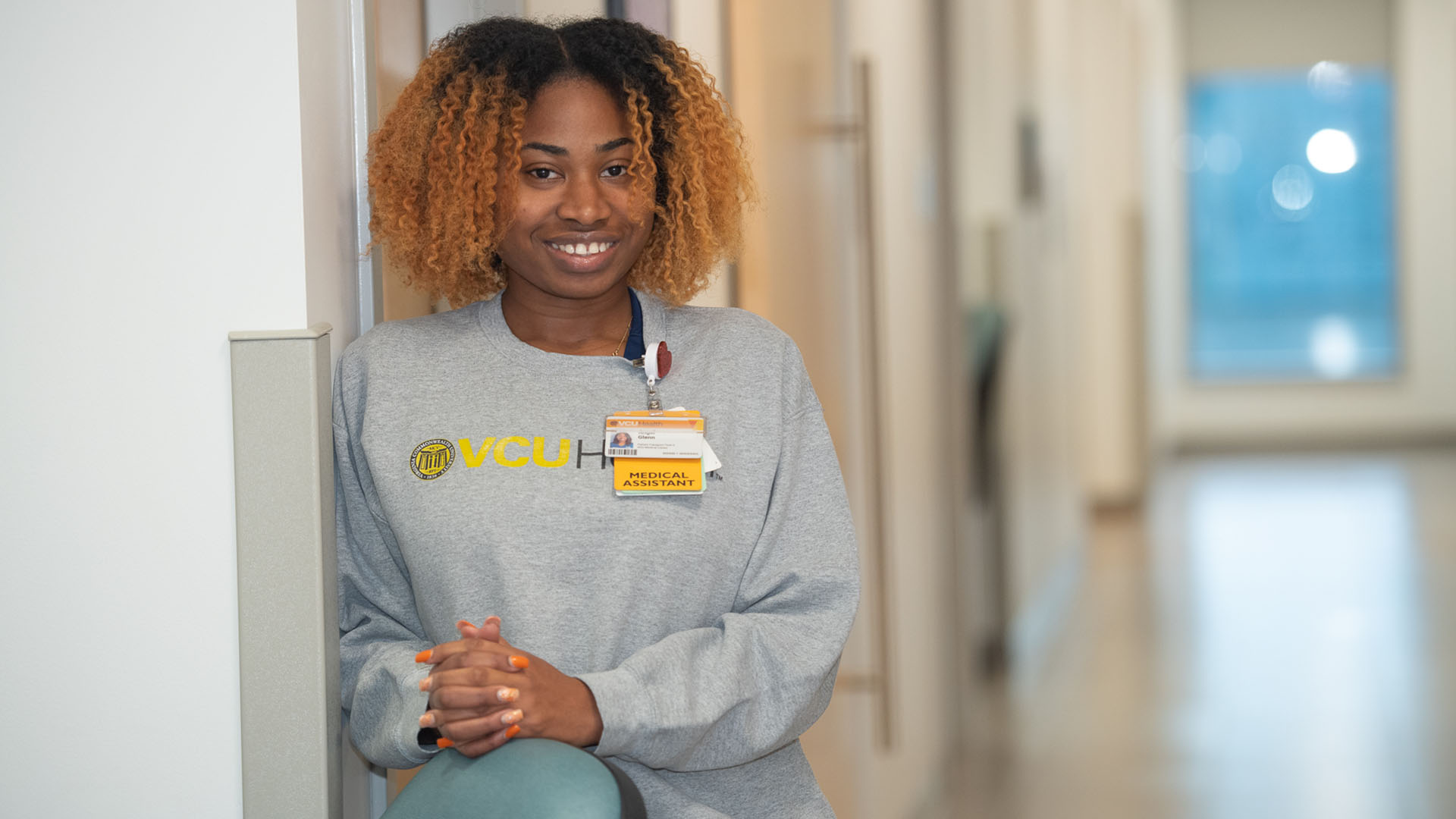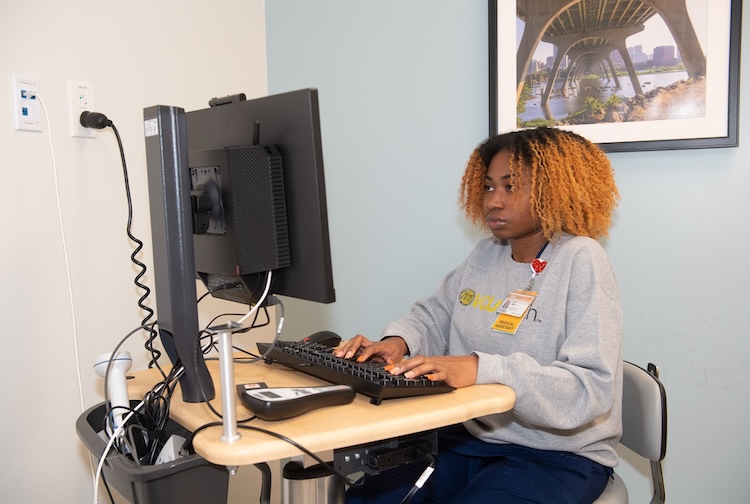
In a typical day, Angel Glenn, a 22-year-old certified medical assistant in the VCU Health neurology department, makes sure patients get their medication refills and forms sent to the correct doctor. Her duties also include checking over patients’ referrals – ensuring they are processed correctly – and scheduling medical visits.
Glenn always knew she would work in the medical field and took numerous science classes at Huguenot High School in Richmond. She thought she would then go to community college to become an EMT. While she knew there are a lot of jobs in the medical field, she didn’t know exactly which direction to go.
When she heard a presentation at her high school about the Pathways to Healthcare Workforce program at VCU Health, she applied to start working and earning a salary immediately.
Glenn was hired in the health system’s department of patient transportation. The program supported her through the job application process, providing training sessions focused on creating professional resumes and nailing job interviews.
“I learned a lot of new things, even in transport,” Glenn said. “It’s an entry-level job, I still learned so many things procedure-wise. We would take patients to dialysis and endoscopy. I learned what those different departments and different nurses do.”
When Glenn wanted to take the leap and apply for a job as a certified medical assistant, the Pathways to Healthcare Workforce program helped her access financial assistance through the department’s partnership with the Community College Workforce Alliance (CCWA) to pay for classes to master the needed skills to complete the program and certification exam.
“I had a lot of support,” Glenn said. “The leadership was very helpful. Everybody was very friendly and nice. They would help you or get the resources you needed.”
Glenn is just one of 282 young adults who have gone through one of the two VCU Health Pathways programs that help participants transition into entry-level positions, such as administrative assistant, patient transport tech, dietary aide, certified medical assistant, and patient access representative, to name a few. Pathways to Healthcare Workforce aids high school students transition into these roles, while Pathways Connect works with adults. The programs partner with Virginia Community Colleges and CCWA to train and prepare adult participants for positions that require professional certifications, credentials and associates degrees.

After joining the VCU Health Pathways to Healthcare Workforce program, Angel Glenn was able to start working and receive training for entry-level positions within the health system. (VCU Enterprise Marketing and Communications)
Growing and supporting a new health care workforce
The VCU Health Pathways programs aim to bridge the gaps for communities often underrepresented in health care, helping many to find employment within the health system and access higher education. The programs also implement strategies and build partnerships to improve the health of patients, including nonmedical factors such as transportation and food access.
Porsha Bennett is the manager of VCU Health’s Workforce Development & Strategies department, which oversees these workforce development programs. The department is under the Division of Community Health led by Sheryl Garland, chief of health impact officer. The programs launched in 2018 by the former director Harrison Hayes.
Bennett says Glenn and her colleagues in the program have excelled in their roles at the health system.
“I’m just really proud of them,” Bennett said. “You can tell that they’re proud of what they’ve accomplished. They are hard workers.”
Bennett volunteered and worked as a patient transport tech at VCU Health while earning a bachelor’s degree in community health education. She graduated in May from the Virginia Commonwealth University College of Health Professions with a master’s in health administration. As the first in her family to graduate from a four-year institution, she is passionate about workforce development because she experienced a similar employment journey to those she now serves.
“We mentor and provide career coaching to support program participants. This includes transitioning into a professional environment.” Bennett said. “In many cases high school graduates may face challenges adjusting to full-time work expectations. In addition, we work closely with hiring managers and human resources to ensure successful employment and retention.”
Participants of the Pathways to Healthcare Workforce program also attend workshops on goal setting, mock-interviews, conflict resolution, work readiness and financial literacy.
As part of its partnership with the CCWA, over the past 2 years, 94 medical assistants have been placed throughout VCU Health. Twenty-three current team members completed the medical assistant program and have continued to have career advancement opportunities in various fields.
“Because of a medical assistant shortage, we created a medical assistant pipeline program with CCWA. We recruit students after program completion. We then help participants to seek employment, as a medical assistant primarily in our outpatient clinics,” Bennett said.
Building more pathways
VCU Health Pathways has received additional support from two recent grants, which will expand its impact in the community. A recent $74,000 grant from the Truist bank supports the partnership with CCWA. Another $1 million pending grant from the U.S. Department of Labor aims to strengthen the program’s relationships in the Richmond region as well as expand and create more pipeline programs for communities served by VCU Health Tappahannock Hospital and VCU Health Community Memorial Hospital in South Hill.
As the vision for this specialized health care workforce training initiative continues to grow, so does Glenn’s vision of her future.
Even after securing her role as a certified medical assistant, Glenn continues to expand her knowledge by learning about neurological conditions such as the signs of stroke and specific issues encountered by epilepsy patients. Five years from now, she plans to be on the path to pursue nursing.
“I think I want to become a licensed practical nurse (LPN), and then I’m not sure if I want to jump straight in. Slow is better than rushing, especially right now with trying to maintain a full-time job and going to school,” Glenn said. “It’s definitely possible, you just have to move some stuff around and slowly get there.”

